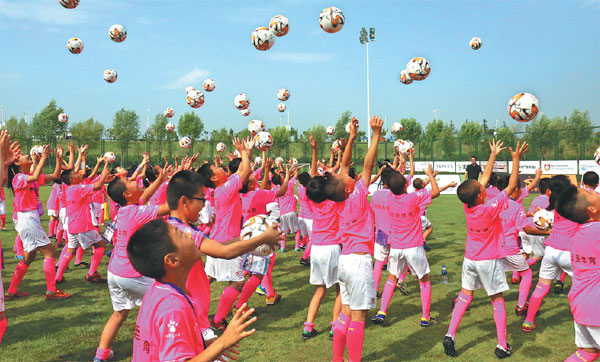Germans kick in with expertise
By Chen Xiangfeng in Weinan, Shaanxi province (China Daily) Updated: 2017-07-20 07:24While President Xi Jinping and German Chancellor Angela Merkel have drawn a blueprint for top-level soccer cooperation between the two countries, grassroots exchanges among clubs, organizations and companies are flourishing.
Bundesliga teams like Bayern Munich, Schalke and Bayer Leverkusen are frontrunners in helping develop the Chinese game through friendly matches, soccer academies and training camps.
This month, Leverkusen and Hansum Sports opened training camps in three cities - Dunhuang, Gansu province, Weinan, Shaanxi province and Taizhou, Jiangsu province - hoping the advanced German youth training system will benefit young players and coaches in China's elementary and high-school programs.
"A lot of Chinese coaches teach young players the wrong ideas about soccer, which makes it extremely difficult for them to change their habits when turning professional," said Jia Xiuquan, former head coach of China's youth team.
|
Youngsters from elementary schools in Weinan, Shaanxi province, take part in a soccer training camp on Tuesday. Organized by Hansum Sports, the program enlists coaches from Bundesliga club Bayer Leverkusen to teach kids and coaches at the grassroots level. Provided to China Daily |
"At the grassroots level, it's very important that coaches from soccer powers like Germany, England and Spain are invited to China to introduce the best training systems to our players and coaches."
Jia is one of the experts taking part in a training camp exchange in Weinan, where two of Leverkusen's reserve-team coaches were invited by Hansum Sports and opened camps for hundreds of kids from elementary schools.
"Chinese coaches like to pick players who are strong, tall and fast. But when we look at the young players in Germany, Brazil and even Japan, they have different physiques but their sense of soccer and teamwork is the same," said Jia.
"I hope more coaches from Germany and other countries can come to China to tell our coaches that soccer players need not be just strong and fast. The most important thing is to find and develop those who have the best sense for the sport."
Germany's Under-21 team won the European championship earlier this month and its senior squad won the Confederations Cup with an experimental lineup.
"The key behind German soccer's success is youth training," said Nikolay Iliev, Leverkusen's youth-team coach who is involved in the Chinese training camp.
"It's an honor for us to be part of the exchange between the two countries, and we hope a long-term cooperation can be set up."
Last November, China and Germany signed a five-year agreement to boost soccer, witnessed by Vice-Premier Liu Yandong during her visit to Germany.
Soccer exchanges have been booming since a 2014 meeting between Xi and Merkel - both of whom are avid fans of the game. The leaders met again this month when Xi visited Germany and watched a youth match between the countries.
"The aim of the agreement is to support the development of Chinese football through several initiatives, including the training of players, coaches and referees, as well as through an exchange of expertise in the organization of leagues," the German Football Federation said in a statement.
Volker Heun, founder and CEO of Invest in Football GmbH in Dusseldorf, said the partnership shows the closeness of the relationship, which has paved the way for Germany to help China become a soccer power.
"Under the framework of this cooperation, I believe many new opportunities will occur," said Heun.
"We must try to explore opportunities by training boys at age 7 or 8."
The Chinese Football Association recently announced an under-20 team from China will compete in Germany's fourth-tier Regionalliga Sudwest in the 2017-18 season.
chenxiangfeng@chinadaily.com.cn
- 'Cooperation is complementary'
- Worldwide manhunt nets 50th fugitive
- China-Japan meet seeks cooperation
- Agency ensuring natural gas supply
- Global manhunt sees China catch its 50th fugitive
- Call for 'Red Boat Spirit' a noble goal, official says
- China 'open to world' of foreign talent
- Free trade studies agreed on as Li meets with Canadian PM Trudeau
- Emojis on austerity rules from top anti-graft authority go viral
- Xi: All aboard internet express












